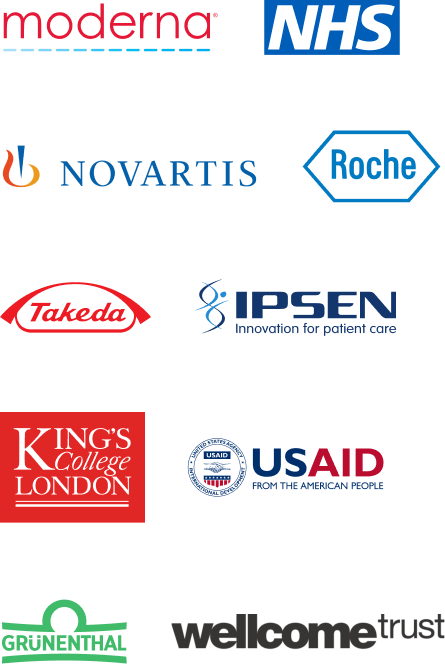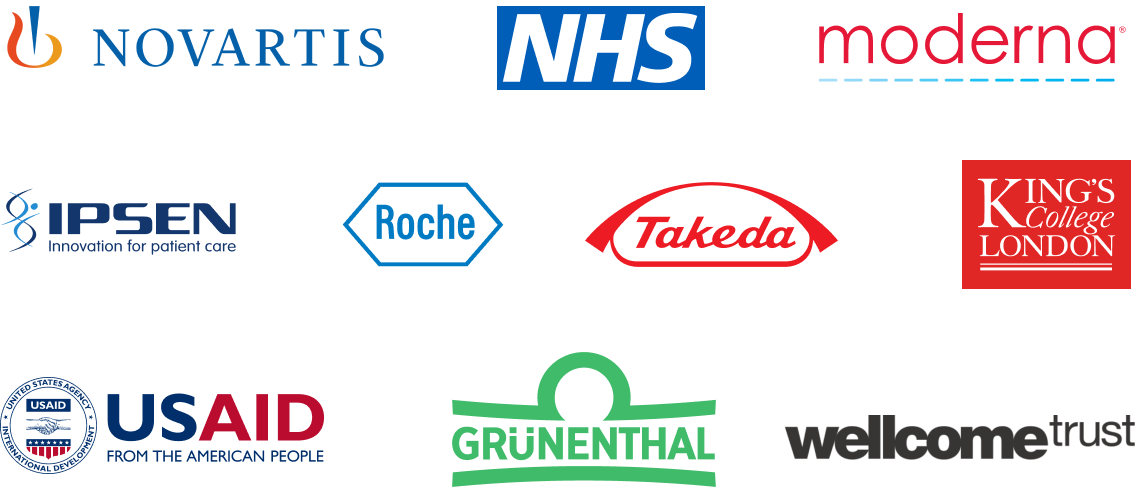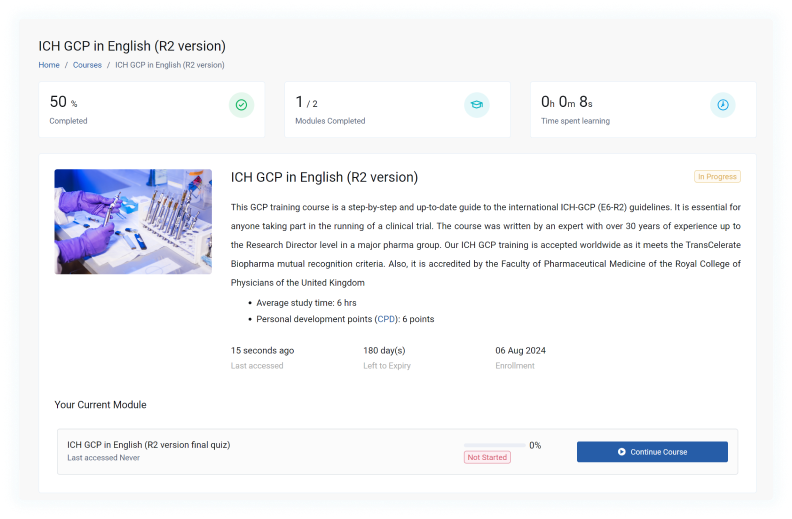Course Syllabus
- The History of Good Clinical Practice (GCP)
- What is GCP?
- Why is ICH GCP Important?
- The Principles of ICH GCP
- Additional Learning Points
- Documentation and Version Control
- Quality Assurance (QA)
- Key Resources
- Introduction
- Responsibilities of the CA
- Responsibilities of the IEC
- Subject Informed Consent Forms (ICF): Part 1
- Subject Informed Consent Forms (ICF): Part 2
- Composition, Functions, Operations, Procedures, and Records
- Introduction
- Investigator Responsibilities
- Investigator Qualifications and Agreements
- Adequate Resources
- Medical Care of Trial Subjects: Part 1
- Medical Care of Trial Subjects: Part 2
- Communication with the Competent Authority
- Compliance with the Protocol
- Investigational Medicinal Products
- Randomisation Procedures and Un-blinding
- Informed Consent of Trial Participants
- Informed Consent of Trial Participants: The Consent Discussion
- Informed Consent of Trial Participants: Obtaining Consent Subjects Who Cannot Read or Write
- Informed Consent of Trial Participants: Obtaining Consent of Minors and “Mentally Incompetent” Subjects
- Informed Consent of Trial Participants: Obtaining Consent from Incapacitated Subjects
- Informed Consent of Trial Participants: Updating Consent
- Records and Reports: Introduction
- Records and Reports: Study Site Files
- Records and Reports: Updates & Amendments
- Records and Reports: Source Documents
- Records and Reports: Financial Information
- Records and Reports: The Case Record Form
- Records and Reports: Recording Subject Data
- Premature Termination or Suspension of a Trial
- Progress Reports and Final Reports by Investigator
- Archiving
- Introduction
- Quality Management: Part 1
- Quality Management: Part 2
- QA and QC (Quality Assurance and Quality Control)
- QA and QC (Quality Assurance and Quality Control): Standard Operating Procedures
- QA and QC (Quality Assurance and Quality Control): Agreements and Contracts
- Contract Research Organisations (CROs)
- Medical Expertise
- Trial Design
- Trial Management and Data Handling: Part 1
- Trial Management and Data Handling: Part 2
- Trial Management and Data Handling: Part 3
- Electronic Data Systems
- Record Keeping
- Investigator Selection: Introduction
- Investigator Selection: Permissions
- Investigator Selection: Responsibilities
- Investigator Selection: Compensation
- Financing
- Notification/ Submission to Regulatory Authorities
- Gaining CA Approval in the EU
- Confirmation of Review by the Competent Authority
- Information on Investigational Medicinal Products (IMPs)
- Manufacturing, Packaging, Labelling, and Coding Investigational Products: Part 1
- Manufacturing, Packaging, Labelling, and Coding Investigational Products: Part 2
- Supplying and Handling Investigational Products
- Record Access
- Audit and Inspection
- Noncompliance
- Premature Termination or Suspension of a Trial
- Clinical Trial/Study Reports
- Multicentre Trials
- Introduction
- Monitoring: Part 1
- Monitoring: Part 2 – Monitor Responsibilities
- Monitoring: Part 3 - The Monitoring Visit
- Monitoring: Part 4 – Verification of Investigational Medicinal Products (IMP)
- Complying with the Protocol, Amendments, SOP and Guidance
- Verifying Informed Consent
- The Case Record Form (CRF) and Source Documents
- Verifying Subject Data
- Errors
- Closing out the Monitoring Visit
- The Monitoring Report & Plan
- Quality Management - Centralised Monitoring
- Fraud and Misconduct
- Introduction
- Adverse Drug Reaction Reports: Part 1 – Adverse Events (AEs)
- Adverse Drug Reaction Reports: Part 2
- Adverse Drug Reaction Reports: Part 3
- Adverse Drug Reaction Reports: Part 4 – Adverse Events of Special Interest
- Adverse Drug Reaction Reports: Part 5 – Periodic Safety Reports
- Adverse Drug Reaction Reports: Part 6
- Introduction
- Protocol Structure and Content
- Introduction
- Investigator Brochure Structure and Content
- Introduction
- Essential Documents
- Archiving
- Documents to be Present Pre-Study
- Documents to be Present During the Study
- Documents to be Present Post-Study
- Glossary & Abbreviations
- Useful Reference Documents List
Our GCP certified customers


Good Clinical Practice (GCP) training is a vital educational programme designed for individuals involved in clinical research. It provides comprehensive instruction on the ethical and scientific standards that are crucial for conducting high-quality clinical trials. This training is based on the globally recognised guidelines set forth by the International Council for Harmonisation (ICH).
The key objectives of GCP training include:
- Safeguarding the rights, safety, and wellbeing of human participants
- Upholding the accuracy and reliability of data collected during clinical trials
- Fostering consistent, top-tier practices across all facets of clinical research
Our Whitehall Training GCP course thoroughly covers these essential areas, offering learners a robust understanding of both the theoretical principles and practical applications of Good Clinical Practice. By completing this course, participants gain the knowledge necessary to conduct clinical trials in accordance with international standards and best practices.
For individuals seeking to engage in clinical trial research, a GCP certificate is essential.
Those looking to broaden their knowledge of the clinical research field will find GCP certification particularly advantageous for several reasons:
- It guarantees adherence to globally recognised standards
- It bolsters the credibility and calibre of research conducted
- It safeguards the rights and wellbeing of study participants
- It opens up more career opportunities within clinical research
Our Whitehall Training Good Clinical Practice Course not only provides you with the necessary certification but also imparts practical knowledge, enabling you to effectively implement GCP principles in your day-to-day work.
GCP certification is crucial for numerous roles within clinical research:
- Lead Researchers and Co-investigators: Those with primary responsibility for conducting trials at research facilities.
- Clinical Study Team Members: This includes research assistants, trial nurses, and other on-site personnel involved in study administration.
- Trial Sponsors and Research Organisations: Individuals overseeing the planning, commencement, and documentation of trials.
- Regulatory Body Representatives: Officials tasked with supervising and assessing trial adherence to regulations.
- Ethics Committees and Review Boards: Professionals who scrutinise and endorse trial protocols.
- University and Research Centre Staff: Those ensuring institutional research meets international benchmarks.
- Researchers Funded by National Health Bodies: All investigators and team members involved in nationally funded clinical studies.
Our Whitehall Training Good Clinical Practice Course is designed to accommodate this broad spectrum of professionals, offering role-specific knowledge alongside fundamental GCP concepts.
Our Good Clinical Practice training programme thoroughly covers the ICH-GCP (E6-R2) international guidelines, fulfilling the necessary training requirements for participation in global clinical trials. This comprehensive course serves as an up-to-date, step-by-step guide to the international ICH-GCP (E6-R2) guidelines, making it indispensable for anyone involved in clinical trial management.
The course content was developed by an industry veteran with more than three decades of experience, including a tenure as Research Director at a prominent pharmaceutical company. It has received accreditation from the Faculty of Pharmaceutical Medicine of the Royal College of Physicians in the UK. To cater to a diverse audience, we offer the course in multiple languages, including English, German, Bulgarian, French, Italian, Japanese, Polish, Portuguese, Russian and Spanish. Additionally, we have crafted region-specific versions tailored to the regulatory frameworks of Australia, the UK, the US, France, Germany and Latin America.
Our GCP training boasts a user-friendly, visually engaging format that facilitates easy cross-referencing with the ICH-GCP E6 document. Drawing from the author's extensive industry knowledge, the course provides valuable practical insights into the application of Good Clinical Practice principles. As an added benefit, participants can earn 6 CPD points upon successful completion of this accredited programme.
Indeed, our GCP course has been formally accredited by a prestigious body in the field. The Faculty of Pharmaceutical Medicine at the Royal College of Physicians has given its stamp of approval to our training programme. This organisation is well-known in the UK as the professional body for physicians working in the pharmaceutical industry. Since 1989, they have been setting the bar high for research standards.
What does this mean for you? By choosing our accredited course, you can be confident that the training meets stringent industry and academic criteria. The certification you'll receive upon completion is widely acknowledged in the field, adding significant value to your professional profile.
The price of GCP certification can vary based on several key factors:
- Official recognition: Has the course received approval from reputable organisations?
- International compliance: Does the certification meet ICH standards, allowing participation in global clinical trials?
- Content standards: Is the material current and authored by industry professionals?
- Availability: For how long can students access the course materials?
Whitehall Training's Good Clinical Practice course is priced at £79, reflecting its high-quality offering:
- Official recognition: The course carries accreditation from the Royal College of Physicians, awarding 6 CPD points.
- International compliance: Upon completion, researchers are equipped to engage in clinical trials, in line with ICH E6(R2) guidelines.
- Content standards: Our GCP expert, Lucy Parker, draws from over ten years of experience leading research across major institutions like the NHS to create our course content.
- Availability: We support ongoing professional development by providing unlimited access to course resources.
For group bookings, we offer a 10% discount on purchases of 5 licences at checkout. If you're interested in larger group discounts, please reach out to our team for more information.
Whilst some no-cost GCP training resources can be found, they typically come with several drawbacks:
- The content may be of lower quality, lacking accreditation and potentially outdated
- These courses often don't provide official certification, which is essential for conducting clinical research
It's worth noting that these free options can serve as a basic introduction to GCP principles for those seeking a general overview. However, for professionals requiring comprehensive, accredited training that enables them to participate in clinical trials, Whitehall Training's Good Clinical Practice Course offers a more robust and recognised solution. Our course ensures you receive up-to-date, high-quality content and the necessary certification to engage in clinical research activities.
Our comprehensive Good Clinical Practice (GCP) course is crafted to offer a deep dive into the crucial principles and practices necessary for executing ethical and scientifically robust clinical trials. The programme's structure encompasses both basic and more complex modules, catering to learners across all experience levels.
The course curriculum addresses several vital areas, including:
- The historical context and core tenets of GCP
- Key stakeholder duties, from investigators to sponsors and monitors
- Ethical deliberations and processes for obtaining informed consent
- Creating and adhering to trial protocols
- Managing safety reports and adverse incidents
- Ensuring data quality and integrity
- Navigating regulatory landscapes and authority interactions
- Crucial documentation and record maintenance
- Proper handling of investigational medicinal products
- Best practices in site management
Acquiring your GCP certificate involves a simple two-stage process:
Work through the interactive educational content provided in the course.
Successfully complete the online assessment at the end of the training.
Feeling apprehensive about the GCP exam? There's no need for concern. The assessment is merely a way to confirm that you've grasped the essential concepts and are prepared for involvement in clinical research. Should you not pass on your first attempt, you can easily review any areas you're unsure about using our comprehensive resource library, then have another go at the exam.
Remember, the goal is to ensure you're well-equipped with the necessary knowledge, not to catch you out. Our Whitehall Training Good Clinical Practice Course is designed to support your learning journey every step of the way.
Our Good Clinical Practice (GCP) course is structured to ensure participants not only absorb the material but can also implement it effectively in real-world clinical research environments. The course employs various evaluation methods throughout:
-Continuous Evaluation: As learners progress through the modules, they encounter interactive quizzes and scenario-based exercises. These serve to solidify crucial concepts and enable participants to assess their comprehension along the way.
-Comprehensive Final Assessment: The course concludes with a thorough examination that evaluates the learner's understanding of GCP principles and practices. This assessment covers all key areas from the course, including:
- Ethical implications in clinical studies
- Regulatory standards and adherence
- Duties and obligations in clinical trials
- Data accuracy and quality control
- Adverse event management and safety reporting
-Practical Implementation: Several questions in the final assessment are crafted to evaluate the learner's capacity to apply GCP principles to lifelike clinical trial situations.
To ensure learners are fully equipped to conduct their trials, successful completion of the final assessment is necessary to attain GCP certification.
Learners may attempt the final assessment as many times as needed, guaranteeing that they achieve the required level of proficiency and, consequently, become GCP qualified.
Our Good Clinical Practice (GCP) course is tailored to suit a broad spectrum of individuals engaged in clinical research. Whilst prior knowledge of clinical trials can be advantageous, it isn't essential. We've carefully crafted the content to be accessible and beneficial for participants with varying levels of experience and diverse roles within the clinical research field.
This training is particularly well-suited for:
- Research Nurses
- Clinical Trial Coordinators
- Lead Investigators and Co-Investigators
- Study Managers
- Statisticians and Data Analysts
- Professionals in Regulatory Affairs
- Specialists in Quality Assurance
- Members of Ethics Committees
- Clinical Trial Pharmacists
- Staff from Sponsoring Organisations and Contract Research Organisations (CROs)
Whether you're embarking on your clinical research journey or seeking to update your existing knowledge, our course offers a thorough exploration of GCP principles and their real-world implementation. The curriculum is structured to accommodate both newcomers to the field and seasoned professionals looking for a comprehensive refresher.
Yes, our Good Clinical Practice (GCP) course is fully web-based, providing learners with unparalleled convenience and adaptability. This digital format offers numerous benefits:
-Personalised learning speed: Students can navigate the course content at their own rhythm, aligning with their unique learning preferences and time constraints. This approach enables a more thorough understanding of the material without the time pressures typically associated with traditional classroom settings.
-Round-the-clock availability: The course can be accessed at any time, from any internet-enabled device. Whether you're at your desk, in your living room, or on the move, you can engage with the course material whenever it suits you best.
The ICH is a worldwide organisation that develops guidelines for pharmaceutical research and development, with Good Clinical Practice (GCP) being a crucial part of these guidelines. Here are some important aspects to understand:
- The ICH unites regulatory bodies and pharmaceutical industry experts.
- It establishes globally accepted standards for conducting clinical trials.
- The ICH GCP guidelines aim to safeguard trial participants and ensure the integrity of collected data.
- These guidelines undergo regular revisions, with ICH GCP E6(R2) being the most recent iteration.
Adherence to these ICH guidelines is essential for conducting clinical trials that meet international requirements. This is precisely why we've developed our comprehensive course, which thoroughly covers all 13 fundamental ICH GCP principles. By completing our training, you'll be well-equipped to carry out research that aligns with global standards and best practices in the field.
ICH Good Clinical Practice E6 (R2) represents the most up-to-date version of the Good Clinical Practice guidelines, published in 2016 by the International Council for Harmonisation of Technical Requirements for Pharmaceuticals for Human Use. This revision marks a substantial advancement in GCP standards, adapting to the evolving nature of clinical research.
It's essential for clinical research professionals to be well-versed in ICH GCP E6 (R2) for several reasons:
- It sets the current worldwide benchmark for ethically and scientifically robust clinical trial conduct.
- Regulatory bodies across the globe often mandate adherence to these guidelines.
- It plays a vital role in safeguarding study participants and ensuring the integrity of trial results.
- Many research institutions and trial sponsors expect their teams and collaborators to be knowledgeable about and comply with these updated standards.
The Whitehall Training Good Clinical Practice Course offers comprehensive coverage of ICH GCP E6 (R2). Our programme ensures that learners gain a thorough understanding of these revised guidelines and can effectively implement them in their clinical research endeavours.
The International Council for Harmonisation's Good Clinical Practice (ICH GCP) is founded on 13 essential principles that serve as the cornerstone for ethical and scientific standards in clinical research. These crucial elements encompass:
- Conducting research ethically
- Ensuring benefits supersede risks
- Safeguarding participants' rights and wellbeing
- Providing comprehensive supporting evidence
- Developing protocols based on sound scientific principles
- Obtaining approval from Institutional Review Boards or Independent Ethics Committees
- Ensuring qualified medical oversight
- Employing investigators with appropriate qualifications
- Obtaining informed consent from participants
- Ensuring precise data documentation and reporting
- Maintaining participant confidentiality
- Adhering to good manufacturing practices for investigational products
- Implementing robust quality assurance systems
The Whitehall Training Good Clinical Practice Course offers comprehensive instruction on these principles, equipping learners with the knowledge to effectively implement them in practical clinical research scenarios. By thoroughly exploring each principle, our course ensures that participants gain a deep understanding of their significance and application in the field.

